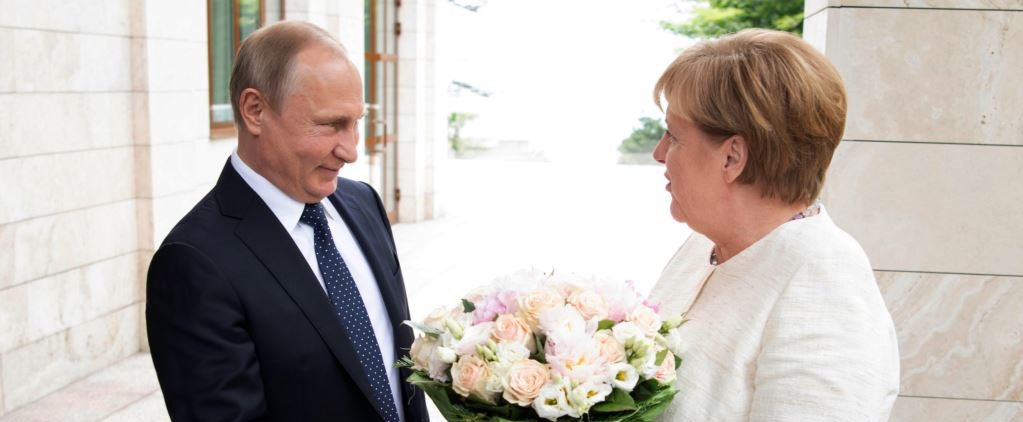Rift in US-Europe ties?
May 22, 2018 | Expert Insights

German Chancellor Angela Merkel recently met with Russian President Putin and the two leaders agreed on key issues including the Nord Stream 2 gas pipeline and the Iran nuclear deal. French President Emmanuel Macron will also soon be heading to St. Petersburg to meet the Russian President.
European countries including France and Germany have disagreed with a number of recent US policies including the Iran deal, and shifting the US embassy to Jerusalem.
Background
The US and Europe have a history of economic and security partnership. With the creation of NATO post World War II, this partnership was strengthened. However, since President Donald Trump took office in 2016, differences between the EU and the US have deepened. When on the campaign trail, President Trump described NATO as “obsolete”, and suggested that it cost the US too much money.
Trump’s decision to recognise Jerusalem as the capital of Israel went against the stance taken by a large majority of the international community, and was criticised by the EU, UN, and the Pope. When Trump announced heavy tariffs on steel imports in February, he did not exclude key EU allies. Trump also withdrew the US from the Paris Climate Accord.
German officials including Foreign Minister Sigmar Gabriel and Defence Minister Ursula von der Leyen criticised the US and Trump’s “America First” approach to foreign policy at the Munich Security Conference earlier this year. “Maybe this can explain why we Germans in particular are so perturbed when we look across the Atlantic — because we no longer recognize our America," Gabriel said. European countries, including Germany, have been critical of US cuts to foreign aid.
The European council president, Donald Tusk has also been critical of President Trump. He noted that Trump was guilty of “capricious assertiveness”. He recently said, “The problem is if your closest friend is unpredictable. It is not a joke now. This is the essence of our problem now with our friends on the other side of the Atlantic. I can agree with President Trump when he said unpredictability can be a very useful tool in politics. But only against enemies and opponents. Unpredictability is the last thing we need with friends and family.”
Analysis
German Chancellor Angela Merkel and Russian President Vladimir Putin met at the Black Sea resort of Sochi on 18th May. In a press conference after the talks, the leaders noted that they had discussed Washington’s withdrawal from the Iran nuclear deal, which is a point of collaboration for the two countries. Chancellor Merkel noted that the deal was not ideal, but that it was essential for maintaining peace in the Middle East and reiterated European support. President Trump had announced that the US would be withdrawing from the “decaying and rotten” deal, against the advice of allies such as France and Germany, whose leaders had personally lobbied the Trump administration. These sanctions will not only affect Iran’s economy but also threaten multiple companies based in Europe. In 2017, EU exports to Iran were worth $12.9 billion.
Merkel and Putin also discussed the Nord Stream 2 project, which is a point of dissatisfaction in the US. The Nord Stream 2 is a gas pipeline that will transport natural gas into the EU from northern Siberia. Russian gas giant Gazprom has partnered with European companies to build the 1,200km line. The Wall Street Journal has reported that the US administration is upping the pressure for Europe to abandon the deal. Trump recently lashed out at Germany for “buying massive amounts of gas from Russia”.
Merkel argued for Ukraine to remain in the transit route from Russia to Germany, and Putin appeared to partially cede to this demand, stating, “We will continue gas shipments (via Ukraine) as long as they are economically justified.” He added, “We believe it (the pipeline) is beneficial for us, we will fight for it” against US sanctions.
Some Russia-aligned observers have pointed out the contrast between these diplomatic negotiations and the hard strategies adopted by the Trump campaign. They claim that the “high-handed tactics” and apparent disregard for European interests could cause a rift between Washington and its European allies. This could cause them to adopt their own policies with Moscow and end some aspects of strategic cooperation.
Counterpoint
Russia and Germany still disagree on a number of major geopolitical issues. Earlier this year, Germany was among the nations that expelled Russian diplomats in a show of support for the UK in the Skripal spy poisoning case. German domestic intelligence agency BfV believes that Russia was behind a number of cyberattacks on German entities. Merkel has also called on Russia to “share responsibility” for the alleged use of chemical weapons in Syria. Germany views Russian military intervention in the Crimean Peninsula in 2014 as a breach of international law.
Furthermore, while both leaders agreed that the Minsk accords were the “only basis” to achieve peace in Eastern Ukraine, Merkel noted a “major breach” of the ceasefire, with continued fighting on the Ukraine-Russia border. While in Sochi, Merkel also indicated that diplomatic outreach with Russia was not indication that Germany was turning its back on the US. “We have a strong transatlantic friendship,” Merkel said. “Through its history there had been disputes and differences of opinion. But this does not call into question the intensity of that transatlantic relationship.”
Assessment
Our assessment is that Trump’s withdrawal from the Iran deal may have provided Moscow with the tools to broach a rapprochement with European nations. European leaders have stressed the importance of maintaining diplomatic relations with Russia despite geopolitical differences. However, there remain a number of serious disagreements between Moscow and Brussels, and EU nations strongly value their strategic ties with the US. We believe that diplomacy is a crucial tool in maintaining global stability and it is important to continue such dialogue.








Comments